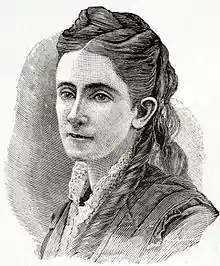Emily Huntington Miller | |
|---|---|
.jpg.webp) | |
| Born | Emily Huntington October 22, 1833 Brooklyn, Connecticut, U.S. |
| Died | November 2, 1913 (aged 80) Mexico City Mexico |
| Resting place | Glendale Cemetery, Akron, Ohio |
| Occupation |
|
| Language | English |
| Nationality | American |
| Spouse |
John E. Miller (m. 1860) |
Emily Clark Huntington Miller (October 22, 1833 – November 2, 1913) was an American author, editor, poet, and educator who co-founded St. Nicholas Magazine, a publication for children. Earlier in her career, she served as the Assistant Editor of The Little Corporal, a children's magazine and Associate Editor of the Ladies' Home Journal. Miller and Jennie Fowler Willing were involved with organizing a convention in Cleveland in 1874,[1] at which the National Woman's Christian Temperance Union was formed.[2] In September 1891, Miller was appointed Dean of Women at Northwestern University in Illinois.
Early years
Emily Clark Huntington was born in Brooklyn, Connecticut, October 22, 1833, the daughter of Methodist pastor Thomas Huntington and Paulina Clark.[3] She received a liberal education and was graduated from Oberlin College, Oberlin, Ohio in 1857.[4][1]
Career

Miller showed her literary ability in her school-days. While yet a girl, she published a number of sketches and stories, which attracted general attention. Thereafter, she was a constant and prolific contributor of sketches, short stories, serials, poems and miscellaneous articles to newspapers and magazines. She earned a reputation by her work on The Little Corporal. She gave much time and work to Sunday-school and missionary interests. She was connected with the Chautauqua Literary and Scientific Circle from its commencement, and served as president of the Chautauqua Woman's Club for four years. She was appointed Dean of Women at Northwestern University,[5] in Evanston, Illinois, where she subsequently resided. Her published literary work included 15 volumes, some of which were republished in England, and all of which found wide circles of readers. Her poetical productions were numerous. Over 100 of her poems were set to music, including her 1865 poem Lilly's Secret, which became the basis for the lyrics to the popular Christmas song Jolly Old Saint Nicholas.[6] In her varied career, she was equally successful as writer, educator, temperance-worker, and journalist.[1]
Besides her literary work, Miller prepared and gave lectures on temperance, also on missionary and educational subjects. She was prominently connected with the Woman's Foreign Missionary Society of the Methodist Episcopal Church, and was a Trustee of Northwestern University at Evanston, Illinois.[7]
Personal life
In 1860, she married John E. Miller. Of their children, three sons survived, including George A. Miller;[4] their only daughter died in infancy. Mr. and Mrs. Miller moved from Evanston, Illinois, to St. Paul, Minnesota, where the husband died in 1882.[1]
Selected works
- Author
- “Kirkwood series”
- “Little Neighbors”
- "Captain Fritz”
- “Fighting the enemy”
- “Highway and Hedges”
- Popular music (lyrics only)
- Hymns (lyrics only) [9]
- Beyond the Dark River of Death
- Blessed Are the Children
- Easter Hymn
- Enter Thy Temple, Glorious King
- Father, While the Shadows Fall
- Hark, the Chorus Swelling
- I Love the Name of Jesus
- I Love to Hear the Story
- O, Land of the Blessed!
- O, Realm of Light
- Stay, Trembling Soul, and Do Not Fear
- Tell the blessed Tidings
- Work and Never Weary
- Baby's first Christmas
References
- 1 2 3 4 Willard & Livermore 1893, p. 701.
- ↑ Gordon, Elizabeth Putnam (1924). Woman Torch Bearers (Public domain ed.). Woman Christian Temperance Union. p. 15.
- ↑ Barnes, Sarah V. (2000). "Miller, Emily Clark Huntington (1833-1913), author, Methodist temperance worker, and educator". American National Biography. doi:10.1093/anb/9780198606697.article.0901041. ISBN 978-0-19-860669-7.
- 1 2 "Mrs. Emily Huntington Miller" (PDF). New York Times. November 5, 1913. Retrieved November 20, 2009.
- ↑ "Radical Woman in a Classic Town: Frances Willard of Evanston" (PDF). Retrieved August 1, 2018.
- 1 2 "Fa-la-la-la facts". USPS.com. United States Postal Service. Archived from the original on 30 November 2019. Retrieved 30 November 2019.
The lyrics were adapted from the 1865 poem "Lilly's Secret" by author and poet Emily Huntington Miller.
- ↑ Willard 1888, p. 154-59.
- ↑ "My good for nothing". Library of Congress. Archived from the original on 2019-11-30.
- ↑ "Emily Huntington Miller". hymntime.com. Archived from the original on 15 July 2014. Retrieved 12 January 2022.
Attribution
 This article incorporates text from this source, which is in the public domain: Willard, Frances Elizabeth (1888). Woman and Temperance: Or, The Work and Workers of the Woman's Christian Temperance Union (Public domain ed.). Park Publishing Company.
This article incorporates text from this source, which is in the public domain: Willard, Frances Elizabeth (1888). Woman and Temperance: Or, The Work and Workers of the Woman's Christian Temperance Union (Public domain ed.). Park Publishing Company. This article incorporates text from this source, which is in the public domain: Willard, Frances Elizabeth; Livermore, Mary Ashton Rice (1893). A Woman of the Century: Fourteen Hundred-seventy Biographical Sketches Accompanied by Portraits of Leading American Women in All Walks of Life (Public domain ed.). Moulton. p. 701.
This article incorporates text from this source, which is in the public domain: Willard, Frances Elizabeth; Livermore, Mary Ashton Rice (1893). A Woman of the Century: Fourteen Hundred-seventy Biographical Sketches Accompanied by Portraits of Leading American Women in All Walks of Life (Public domain ed.). Moulton. p. 701.